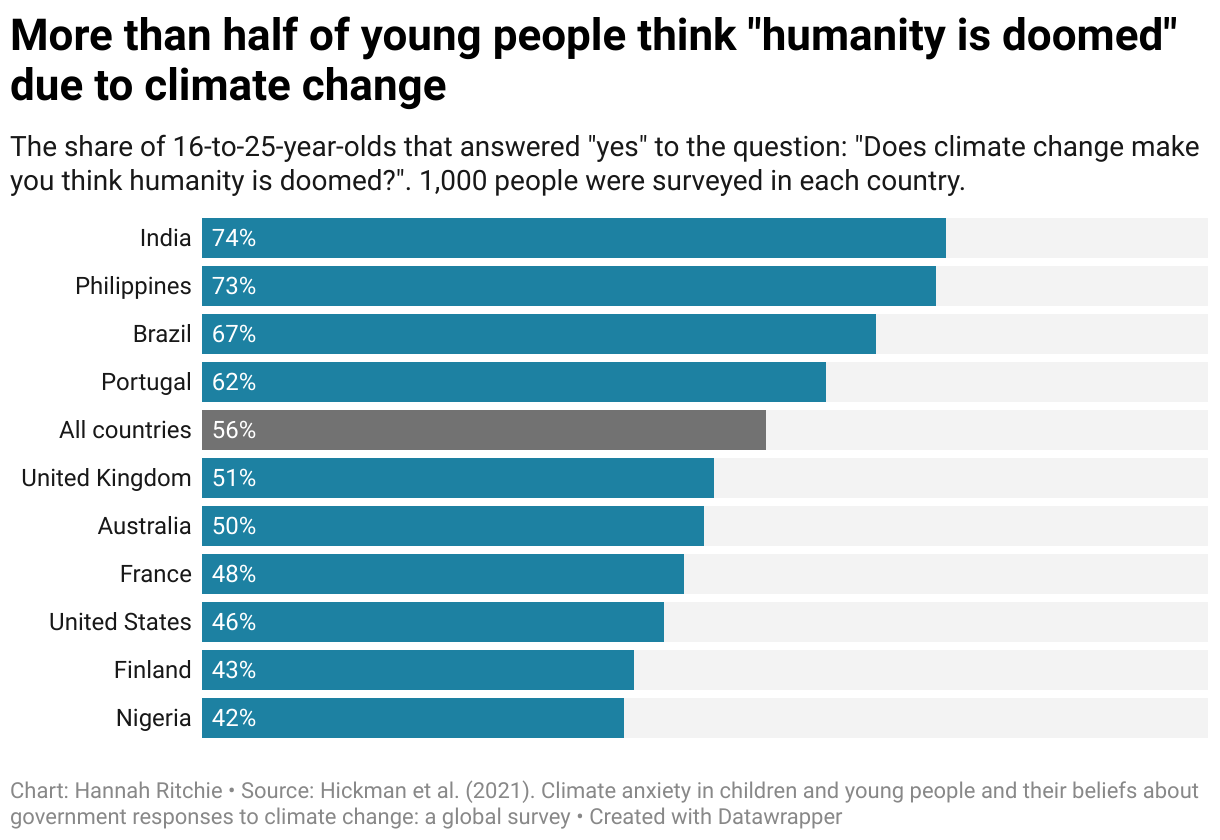Every demographic lands in my inbox, but young people are the most common. There is a panicky tone to their emails.
I can feel the desperation beneath their words: they’re reaching out for a lifeline. They want and need someone to tell them that things aren’t as bad as the headlines say, and that it’s not too late to change things.
It’s the same when I step out of my inbox, into the ‘real’ world. People around me often feel lost and helpless. I’ve struggled with it for many years, too.
But I was never quite sure how common this feeling was. Most people follow me for my work on sustainability and climate change. My social circles are also filled with people knee-deep in these topics. Perhaps I have created an echo chamber, where feelings of anxiety run high.
Survey results suggest otherwise. This anxiety is widespread, especially among young people.
In the largest international survey to date, Caroline Hickman and her colleagues interviewed 10,000 young people, aged 16 to 25 years old, about their attitudes toward climate change.1 This covered ten countries – interviewing 1,000 young people in each – ranging from the UK and US to the Phillippines and Nigeria.
Feels of despair and anxiety were high, regardless of where they came from.
More than half – 56% – said that “humanity is doomed” due to climate change.2 We see these results by country in the chart. I’ve also made charts of the results for other questions in the box below.
Three-quarters said that the “future is frightening” due to climate change. And more than half thought they’d have fewer opportunities than their parents.

I think it’s worth adding some caution around these results, as we always should with survey data.
People interpret questions differently. For example, what does “doomed” really mean? People can often feel ‘led’ to certain answers. Or give quick replies without really considering whether they just climate change is quite worrying, or whether they really think that their future is in peril because of it.
But I know from personal experience and interactions with others that many people really do mean ‘doomed’ and ‘frightening’ when they say it. It might not be 50% or 75%, but a lot feel it this deeply.
We need to change the narrative on climate change
These feelings are not surprising.
We’re hit with catastrophic headlines every hour. Leading environmental activists like Roger Hallam, a founder of Extinction Rebellion, tell young people that it’s the end, and they should give up hope of things changing.
 Will Climate Change Make Wine Healthier - or Less Healthy?
Will Climate Change Make Wine Healthier - or Less Healthy?
Here’s Rupert Read – a spokesperson for Extinction Rebellion – towering over small schoolchildren on a desk, telling them that they probably won’t have a future ahead of them.3
"People probably sometimes ask you "What are you going to be when you grow up? But we've reached a point in human history where the question also has to be asked "What are you going to do if you grow up?"
I still can’t believe that these are the people that schools invite to teach their kids about climate change.
As I outlined in an article in WIRED last year – Stop Telling Kids They’ll Die From Climate Change – we need to change this narrative. We need to stop putting that burden on our kids – not only because it’s cruel, but because it’s wrong and ineffective in helping us turn things around.
We don’t need to pull the wool over their eyes. We don’t have to pretend that there is no climate problem. But we can and should focus on what we can do about it. Because we can do something about it. A lot.
Importantly, it doesn’t have to come from a place of sacrifice. It can come from a place of opportunity. It’s not about cutting our lives back to the bare minimum to scrape by. It’s about using the changes that tackling climate change needs – abundant low-carbon energy, efficient transport networks, more climate-friendly diets, cleaner air, the list goes on – to build a better life for ourselves, others, and the other species we share this planet with.
This year I won the award as Scotland’s Youth Climate Champion. I take that responsibility very seriously, and I’m always thinking about how we talk about these thorny environmental problems. Collectively, we’re getting this messaging wrong. We can do much better.
The main message I want to inspire is that it’s not too late to tackle climate change. The future is not a choice between dying off, or living an incredibly limited life. There is a third option: building a world where 8, 9, or 10 billion people can flourish, while reducing our environmental impact at the same time.















